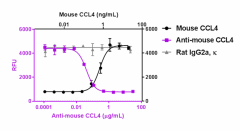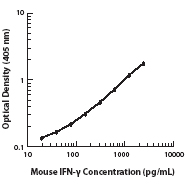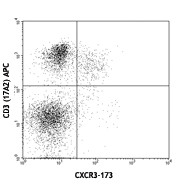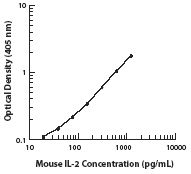- Clone
- W15194A (See other available formats)
- Regulatory Status
- RUO
- Other Names
- C-C motif chemokine 4, Immune activation protein 2 (ACT-2), Macrophage inflammatory protein 1-bet (MIP-1-beta), Protein H400, SIS-gamma, Small-inducible cytokine A4, MIP-1β
- Isotype
- Rat IgG2b, κ
- Ave. Rating
- Submit a Review
- Product Citations
- publications

-

Recombinant Mouse CCL4 (Black Circles, Cat. No. 554606) induces the chemotaxis of mouse Baf3-hCCR5 transfectant chemoattractant cells. Anti-mouse CCL4 antibody (Clone W15194A, Purple Squares) neutralizes the chemotaxis of recombinant mouse CCL4 in Baf3-hCCR5 cells in a dose-dependent manner while the isotype control (Grey Triangles, Cat. No. 400562) does not have the effect. ND50 range: 0.01 - 0.1 µg/mL.
| Cat # | Size | Price | Quantity Check Availability | Save | ||
|---|---|---|---|---|---|---|
| 625503 | 100 µg | 270 CHF | ||||
| 625504 | 1 mg | 715 CHF | ||||
CCL4 is an important proinflammatory cytokine involved in acute and chronic inflammatory responses. CCL4 attracts monocytes, NK cells, dendritic cells, and lymphocytes to sites of injury and inflammation. CCL4 signals through the G-protein-coupled receptor CCR5, and since CCR5 is a major co-receptor for M-tropic HIV strains, the anti-HIV effect of CCL4 has been explored. Thus, binding of CCL4 to CCR5 inhibits HIV entry and reduces the cell surface expression of CCR5. CCL4 has been identified as one of the major HIV-suppressive factors produced by CD8+ T cells. CCL4 also protects against type I diabetes by suppressing islet beta-cell inflammatory responses. In a rat model of experimental autoimmune encephalomyelitis, anti-CCL4 treatment using a neutralizing antibody significantly delayed the development and shortened the duration of the disease. Activated human peripheral lymphocytes secrete a truncated form of CCL4 that lacks the first two amino acids. CCR5 and truncated CCL4 bind to CCR1 and CCR2. Like CCL3, CCL4 is highly acidic and can form high-molecular weight polymers. Consistent with this observation, CCL4 is secreted as high molecular weight aggregates from HIV-I specific cytotoxic T lymphocytes. The polymerization of CCL4 is reversible and is important for in vivo activity. Heterodimers of CCL3 and CCL4 have also been described.
Product DetailsProduct Details
- Verified Reactivity
- Mouse
- Antibody Type
- Monoclonal
- Host Species
- Rat
- Immunogen
- Recombinant Mouse CCL4
- Formulation
- 0.2 µm filtered in phosphate-buffered solution, pH 7.2, containing no preservative.
- Endotoxin Level
- Less than 0.01 EU/µg of the protein (< 0.001 ng/µg of the protein) as determined by the LAL test.
- Preparation
- The Ultra-LEAF™ (Low Endotoxin, Azide-Free) antibody was purified by affinity chromatography.
- Concentration
- The antibody is bottled at the concentration indicated on the vial, typically between 2 mg/mL and 3 mg/mL. Older lots may have also been bottled at 1 mg/mL. To obtain lot-specific concentration and expiration, please enter the lot number in our Certificate of Analysis online tool.
- Storage & Handling
- The antibody solution should be stored undiluted between 2°C and 8°C. This Ultra-LEAF™ solution contains no preservative; handle under aseptic conditions.
- Application
-
Neut - Quality tested
- Recommended Usage
-
Each lot of this antibody is quality control tested by neutralization of the chemotaxis induced by recombinant mouse CCL4 on mouse Baf3-hCCR5 transfectants chemoattractant cells. ND50 range: 0.01 - 0.1 µg/mL. It is recommended that the reagent be titrated for optimal performance for each application.
- Product Citations
-
- RRID
-
AB_2814488 (BioLegend Cat. No. 625503)
AB_2814488 (BioLegend Cat. No. 625504)
Antigen Details
- Structure
- Chemokine
- Distribution
-
CCL4 is secreted by many mature hematopoietic cells including macrophages, T and B lymphocytes, neutrophils, dendritic cells, mast cells and NK cells. Influenza virus-infected bronchial and nasal epithelial cells produce CCL4.
- Function
- CCL4 attracts monocytes, NK cells, dendritic cells, and T cells. CCL4 acts as HIV-suppressive factor. Activating transcription factor 3 (ATF3) limits the amount of CCL4 released by macrophages. IFN-γ and NOS2 repress CCL3 and CCL4 in mouse macrophages via ATF3.
- Interaction
- Monocytes, NK cells, dendritic cells, and lymphocytes.
- Ligand/Receptor
- CCR5
- Cell Type
- Dendritic cells, Endothelial cells, Leukocytes, Lymphocytes, Macrophages, Monocytes, NK cells
- Biology Area
- Cell Biology, Immunology, Innate Immunity, Neuroinflammation, Neuroscience
- Molecular Family
- Cytokines/Chemokines
- Antigen References
-
- Raport CJ, et al. 1996. J. Biol. Chem. 271:17161.
- Guan E, et al. 2001. J. Biol. Chem. 276:12404.
- Guan E, et al. 2002. J. Biol. Chem. 277:32348.
- Meagher C, et al. 2007. Diabetes. 56:809.
- Maurer M and von Stebut E, 2004. Int. J. Biochem. Cell. Biol. 36:1882-6.
- Cocchi F, et al. 1995. Science 270:1811.
- Ren M, et al. 2010. EMBO J. 29:3952.
- Kamin-Lewis R, et al. 2001. Proc. Natl. Acad. Sci. USA 98:9283.
- Chandrasekar B, et al. 2013. J. Infect. Dis. 207:1556.
- Gene ID
- 20303 View all products for this Gene ID
- UniProt
- View information about CCL4 on UniProt.org
Related FAQs
- Do you guarantee that your antibodies are totally pathogen free?
-
BioLegend does not test for pathogens in-house aside from the GoInVivo™ product line. However, upon request, this can be tested on a custom basis with an outside, independent laboratory.
- Does BioLegend test each Ultra-LEAF™ antibody by functional assay?
-
No, BioLegend does not test Ultra-LEAF™ antibodies by functional assays unless otherwise indicated. Due to the possible complexities and variations of uses of biofunctional antibodies in different assays and because of the large product portfolio, BioLegend does not currently perform functional assays as a routine QC for the antibodies. However, we do provide references in which the antibodies were used for functional assays and we do perform QC to verify the specificity and quality of the antibody based on our strict specification criteria.
- Does BioLegend test each Ultra-LEAF™ antibody for potential pathogens?
-
No, BioLegend does not test for pathogens in-house unless otherwise indicated. However, we can recommend an outside vendor to perform this testing as needed.
- Have you tested this Ultra-LEAF™ antibody for in vivo or in vitro applications?
-
We don't test our antibodies for in vivo or in vitro applications unless otherwise indicated. Depending on the product, the TDS may describe literature supporting usage of a particular product for bioassay. It may be best to further consult the literature to find clone specific information.
Other Formats
View All CCL4 Reagents Request Custom Conjugation| Description | Clone | Applications |
|---|---|---|
| Ultra-LEAF™ Purified anti-mouse CCL4 | W15194A | Neut |
Customers Also Purchased
Compare Data Across All Formats
This data display is provided for general comparisons between formats.
Your actual data may vary due to variations in samples, target cells, instruments and their settings, staining conditions, and other factors.
If you need assistance with selecting the best format contact our expert technical support team.
-
Ultra-LEAF™ Purified anti-mouse CCL4

Recombinant Mouse CCL4 (Black Circles, Cat. No. 554606) indu...
 Login / Register
Login / Register 












Follow Us